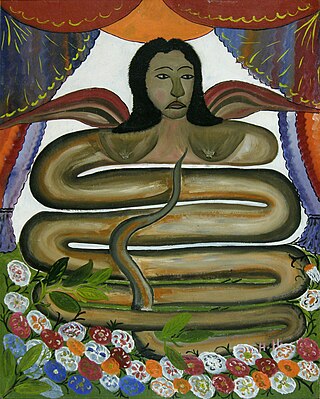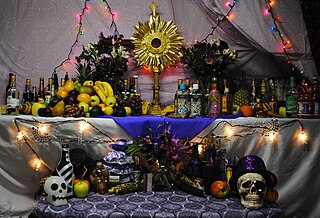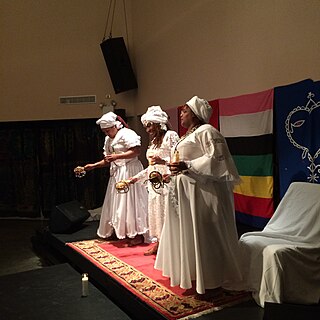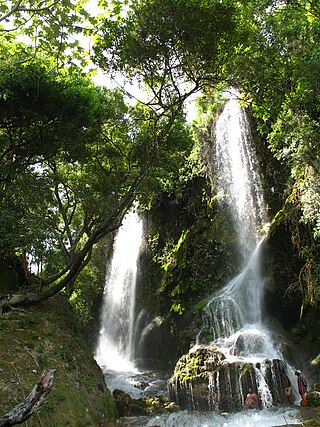
Lwa, also called loa, are spirits in the African diasporic religion of Haitian Vodou and Dominican Vudú. They have also been incorporated into some revivalist forms of Louisiana Voodoo. Many of the lwa derive their identities in part from deities venerated in the traditional religions of West Africa, especially those of the Fon and Yoruba.

Ayida-Weddo, also known as Ayida, Agida, Ayida-Wedo, Aido Quedo, Aido Wedo, Aida Wedo, and Aido Hwedo, is a powerful loa spirit in Vodou, revered in regions across Africa and the Caribbean, namely in Benin, Suriname and Haiti. Known as the "Rainbow Serpent", Ayida-Weddo is the loa of fertility, rainbows, wind, water, fire, wealth, thunder, and snakes. Alongside Damballa, Ayida-Weddo is regarded among the most ancient and significant loa. Considered in many sources as the female half of Damballa's twin spirit, the names Da Ayida Hwedo, Dan Ayida Hwedo, and Dan Aida Wedo have also been used to refer to her. Thought to have existed before the Earth, Ayida-Weddo assisted the creator goddess Mawu-Lisa in the formation of the world, and is responsible for holding together the Earth and heavens. Ayida-Weddo bestows love and well-being upon her followers, teaching fluidity and the connection between body and spirit.

Damballa, also spelled Damballah, Dambala, Dambalah, among other variations, is one of the most important of all loa, spirits in West African Vodun, Haitian Voodoo and other African diaspora religious traditions such as Obeah. He is traditionally portrayed as a great white or black serpent, but may also be depicted as a rainbow. Damballa originated in the city of Wedo in modern-day Benin.

Ayizan is the loa of the marketplace and commerce in Vodou, especially in Benin, Haiti and Suriname.
Azaka-Tonnerre is a loa of thunder in Vodou, especially in Haiti. He is in the same "family" as Azaka Medeh, the loa of harvest.

Papa Legba is a lwa, or loa, in West African Vodun and its diasporic derivatives, who serves as the intermediary between God and humanity. He stands at a spiritual crossroads and gives permission to speak with the spirits of Guineé, and is believed to speak all human languages. In Haiti, he is the great elocutioner. Legba facilitates communication, speech, and understanding. He is commonly associated with dogs. Papa Legba is invoked at the beginning of every ceremony. Papa Legba has his origins in the historic West African kingdom of Dahomey, located within present-day Benin.
In the religion of Haitian Vodou, Captain Debas is a loa of the guede.
Dan Petro is the loa who protects farmers in Vodou. He is the father of Ti Jean Petro.
Diable Tonnere is a loa (deity) who presides over thunder in Haitian Vodou.
Marassa Jumeaux are the divine twins in Vodou. They are children, but more ancient than any other loa. "Love, truth and justice. Directed by reason. Mysteries of liaison between earth and heaven and they personify astronomic-astrological learning. They synthesize the vodou Loa as personification of divine power and the human impotence. Double life, they have considerable power which allow them manage people through the stomach. They are children mysteries."
Loko is a loa, patron of healers and plants, especially trees in the Vodou religion. He is a racine (root) and a rada loa. Among several other loa, he is linked with the poteau mitan or center post in a Vodou peristyle.

Homosexuality in Haitian Vodou is religiously acceptable and homosexuals are allowed to participate in all religious activities. However, in West African countries with major conservative Christian and Islamic views on LGBTQ people, the attitudes towards them may be less tolerant if not openly hostile and these influences are reflected in African diaspora religions following Atlantic slave trade which includes Haitian Vodou.
A bokor (male) or caplata (female) is a Vodou priest or priestess for hire in Haiti who is said to serve the loa, "'with both hands', practicing for both good and evil." Their practice includes the creation of zombies and of ouangas.
The Petwo, also spelled Petro and alternatively known as dompete, are a family of lwa (loa) spirits in the religion of Haitian Vodou. They are regarded as being volatile and "hot", in this contrasting with the Rada lwa, which are regarded as sweet-tempered and "cool."

A manbo is a priestess in the Haitian Vodou religion. Haitian Vodou's conceptions of priesthood stem from the religious traditions of enslaved people from Dahomey, in what is today Benin. For instance, the term manbo derives from the Fon word nanbo. Like their West African counterparts, Haitian manbos are female leaders in Vodou temples who perform healing work and guide others during complex rituals. This form of female leadership is prevalent in urban centers such as Port-au-Prince. Typically, there is no hierarchy among manbos and oungans. These priestesses and priests serve as the heads of autonomous religious groups and exert their authority over the devotees or spiritual servants in their hounfo (temples).
Congo is a handsome but apathetic loa in Vodou. In the Congo Savanne aspect, he is a fierce petro loa. He is a powerful man-eating loa whose patron color is white.
Loa are the spirits of Haitian Vodou and Louisiana Voodoo.

Saut-d'Eau is a commune in the Mirebalais Arrondissement, in the Centre department of Haiti. It has 34,885 inhabitants.
Anaisa Pye is a popular loa within religion in the Dominican Republic. She is considered the patron of love, money, and general happiness within the religion in the Dominican Republic 21 Divisions.
Filomez is a loa that belongs to the Rada nation. She is a water spirit that is served with pastel colors such as blue, pink, and sometimes even green. In some Vodou houses, she is the younger sister of Erzulie Freda. In others, she is not. Filomez is considered to be a very rare, yet potent, loa.







